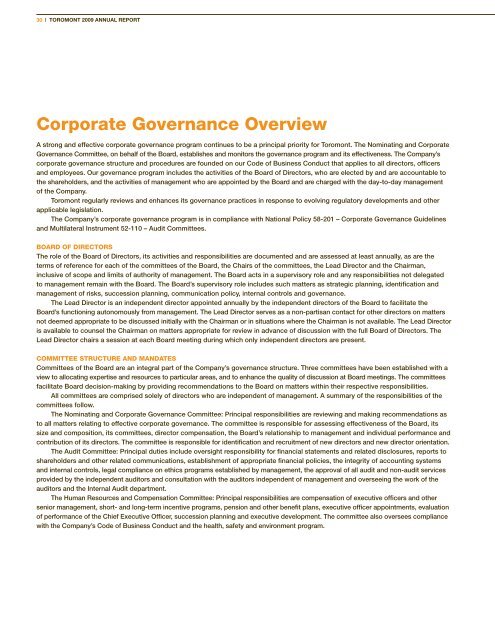2009 Annual Report - Toromont Industries Ltd.
2009 Annual Report - Toromont Industries Ltd.
2009 Annual Report - Toromont Industries Ltd.
You also want an ePaper? Increase the reach of your titles
YUMPU automatically turns print PDFs into web optimized ePapers that Google loves.
30 | TOROMONT <strong>2009</strong> ANNUAL REPORT<br />
corporate governance Overview<br />
A strong and effective corporate governance program continues to be a principal priority for <strong>Toromont</strong>. The Nominating and Corporate<br />
Governance Committee, on behalf of the Board, establishes and monitors the governance program and its effectiveness. The Company’s<br />
corporate governance structure and procedures are founded on our Code of Business Conduct that applies to all directors, officers<br />
and employees. Our governance program includes the activities of the Board of Directors, who are elected by and are accountable to<br />
the shareholders, and the activities of management who are appointed by the Board and are charged with the day-to-day management<br />
of the Company.<br />
<strong>Toromont</strong> regularly reviews and enhances its governance practices in response to evolving regulatory developments and other<br />
applicable legislation.<br />
The Company’s corporate governance program is in compliance with National Policy 58-201 – Corporate Governance Guidelines<br />
and Multilateral Instrument 52-110 – Audit Committees.<br />
BOARd OF diREcTORS<br />
The role of the Board of Directors, its activities and responsibilities are documented and are assessed at least annually, as are the<br />
terms of reference for each of the committees of the Board, the Chairs of the committees, the Lead Director and the Chairman,<br />
inclusive of scope and limits of authority of management. The Board acts in a supervisory role and any responsibilities not delegated<br />
to management remain with the Board. The Board’s supervisory role includes such matters as strategic planning, identification and<br />
management of risks, succession planning, communication policy, internal controls and governance.<br />
The Lead Director is an independent director appointed annually by the independent directors of the Board to facilitate the<br />
Board’s functioning autonomously from management. The Lead Director serves as a non-partisan contact for other directors on matters<br />
not deemed appropriate to be discussed initially with the Chairman or in situations where the Chairman is not available. The Lead Director<br />
is available to counsel the Chairman on matters appropriate for review in advance of discussion with the full Board of Directors. The<br />
Lead Director chairs a session at each Board meeting during which only independent directors are present.<br />
cOmmiTTEE STRUcTURE And mAndATES<br />
Committees of the Board are an integral part of the Company’s governance structure. Three committees have been established with a<br />
view to allocating expertise and resources to particular areas, and to enhance the quality of discussion at Board meetings. The committees<br />
facilitate Board decision-making by providing recommendations to the Board on matters within their respective responsibilities.<br />
All committees are comprised solely of directors who are independent of management. A summary of the responsibilities of the<br />
committees follow.<br />
The Nominating and Corporate Governance Committee: Principal responsibilities are reviewing and making recommendations as<br />
to all matters relating to effective corporate governance. The committee is responsible for assessing effectiveness of the Board, its<br />
size and composition, its committees, director compensation, the Board’s relationship to management and individual performance and<br />
contribution of its directors. The committee is responsible for identification and recruitment of new directors and new director orientation.<br />
The Audit Committee: Principal duties include oversight responsibility for financial statements and related disclosures, reports to<br />
shareholders and other related communications, establishment of appropriate financial policies, the integrity of accounting systems<br />
and internal controls, legal compliance on ethics programs established by management, the approval of all audit and non-audit services<br />
provided by the independent auditors and consultation with the auditors independent of management and overseeing the work of the<br />
auditors and the Internal Audit department.<br />
The Human Resources and Compensation Committee: Principal responsibilities are compensation of executive officers and other<br />
senior management, short- and long-term incentive programs, pension and other benefit plans, executive officer appointments, evaluation<br />
of performance of the Chief Executive Officer, succession planning and executive development. The committee also oversees compliance<br />
with the Company’s Code of Business Conduct and the health, safety and environment program.




